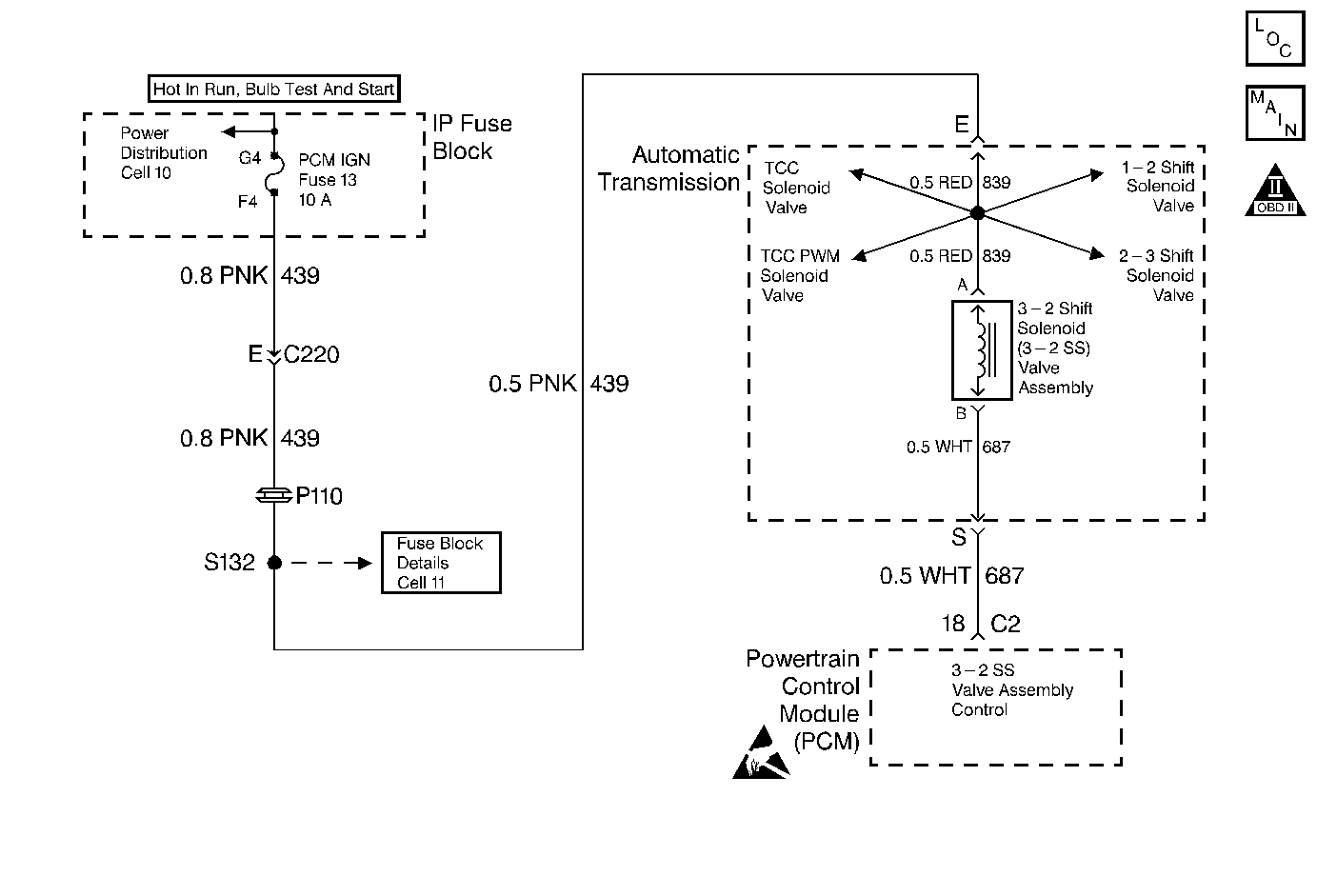
Circuit Description
The 3-2 Shift Solenoid Valve Assembly (3-2 SS Valve Assy) is a normally-closed, 3-port, on/off device. The device controls the 3-2 downshift. The solenoid attaches to the control valve body within the transmission. Circuit 439 supplies ignition voltage directly to the solenoid. The PCM controls the solenoid by providing a ground path on circuit 687. During a 3-2 downshift, the 2-4 band applies as the 3-4 clutch releases. The PCM varies the timing between the 3-4 clutch release and the 2-4 band apply depending on the vehicle speed and the throttle position.
When the PCM detects a continuous open or short to ground in the 3-2 SS Valve Assy circuit or the 3-2 SS Valve Assy., then DTC P1886 sets. DTC P1886 is a type A DTC.
Conditions for Setting the DTC
| • | The System Voltage is 10-17 volts. |
| • | The ignition is ON. |
| • | The PCM commands the solenoid ON and the voltage remains high (B+). |
| • | The PCM commands the solenoid OFF and the voltage remains low (0 volts). |
| • | All conditions are met in 5 seconds. |
Action Taken When the DTC Sets
| • | The PCM commands a soft landing to third gear. |
| • | The PCM commands maximum line pressure. |
| • | The PCM freezes shift adapts from being updated. |
| • | The PCM inhibit the TCC engagement. |
| • | The TCC inhibits 4th gear. |
| • | The PCM illuminates the Malfunction Indicator Lamp (MIL). |
Conditions for Clearing the MIL/DTC
| • | The PCM turns OFF the MIL after three consecutive ignition cycles without a failure reported. |
| • | A scan tool can clear the DTC from the PCM history. The PCM clears the DTC from the PCM history if the vehicle completes 40 warm-up cycles without a failure reported. |
| • | The PCM cancels the DTC default actions when the fault no longer exists and the ignition is OFF long enough in order to power down the PCM. |
Diagnostic Aids
| • | Inspect the wiring for any poor electrical connections at the PCM. Inspect the wiring at the transmission 20-way connector. Look for the following conditions: |
| - | A bent terminal |
| - | A backed out terminal |
| - | A damaged terminal |
| - | Poor terminal tension |
| - | A chafed wire |
| - | A broken wire inside the insulation |
| • | When diagnosing for an intermittent short or an open condition, massage the wiring harness while watching the test equipment for changes. |
Test Description
The numbers below refer to the Step numbers on the diagnostic table.
-
This step verifies that the PCM can control the 3-2 Shift solenoid Valve Assembly.
-
This step verifies that the 3-2 Shift Solenoid Valve Assembly receives power from the ignition through the fuse.
-
This step verifies that the PCM and the wiring properly control the ground circuit.
-
This step measures the resistance of the automatic transmission wiring harness. This step then compares the actual resistance to the expected resistance.
Step | Action | Value(s) | Yes | No | ||||||
|---|---|---|---|---|---|---|---|---|---|---|
1 | Was the Powertrain On-Board Diagnostic (OBD) System Check performed? | -- | Go to Powertrain On Board Diagnostic (OBD) System Check , Section 6 | |||||||
2 |
Important: Before clearing the DTCs, use the scan tool in order to record the Freeze Frame and Failure Records for reference. The Clear Info function will erase the data. Have the DTCs P0753, P0758, P1860, P1864, and P1886 set? | -- | ||||||||
3 |
Refer to Electrical Diagnosis, Section 8. Did you find and correct a problem? | -- | -- | |||||||
Command the 3-2 Shift Solenoid Valve Assembly ON and OFF three times, while listening to the bottom of the transmission pan (a stethoscope may be necessary). Does the solenoid click when commanded? | -- | Go to Diagnostic Aids | ||||||||
Did the test lamp illuminate? | -- | |||||||||
6 | Repair the open or short to ground in the ignition feed circuit 439 to the 3-2 Shift Solenoid Valve Assembly. Refer to Electrical Diagnosis, Section 8. Is the repair complete? | -- | -- | |||||||
Does the test lamp illuminate when you command the shift solenoid ON, and turn OFF when you command OFF? | -- | |||||||||
8 |
Refer to Electrical Diagnosis, Section 8. Did you find and correct a problem? | -- | ||||||||
Is the resistance within the specified range? | 20-32ohms | |||||||||
10 | Inspect the PCM connector terminals for the following conditions:
Did you find and correct a problem? | -- | ||||||||
11 |
Is the resistance within the specified range? | 20-32ohms | ||||||||
12 |
Refer to Electrical Diagnosis, Section 8. Did you find and correct a problem? | -- | -- | |||||||
13 |
Are both measurements greater than the specified value? | 250kohms | Go to Diagnostic Aids | |||||||
14 |
Are both readings greater than the specified value? | 250kohms | ||||||||
15 |
Refer to Electrical Diagnosis, Section 8. Did you find and correct a problem? | -- | -- | |||||||
16 | Replace the 3-2 SS Valve Assy. Refer to 3-2 Shift Solenoid Valve Assembly Replacement, in On-Vehicle Service. Is the replacement complete? | -- | -- | |||||||
17 | Replace the PCM. Refer to Powertrain Control Module Replacement/Programming , Section 6 Is the replacement complete? | -- | -- | |||||||
18 |
Has the test run and passed? | -- | System OK |
